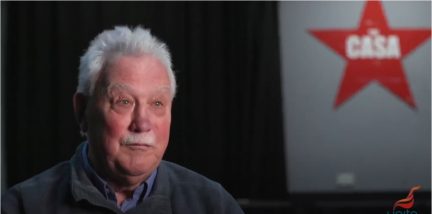UniteLive stories of the year - 'A lesson in tenacity'
WATCH: Unite's new film on the Shrewsbury 24 campaign - UniteLive speaks with filmmaker Morag Livingstone about this vital victory for truth and justice
Reading time: 2 min
Every day over the Christmas period, UniteLive is running a different story from our top stories of 2023. Today, we look back at a new Unite film about the Shrewsbury 24 pickets and their fight for justice.
—
Unite has this week in June released a new film, which you can watch in full below, about the Shrewsbury 24 pickets and their nearly half-century long fight for justice. Their brave fight culminated in victory in 2021 after a concerted campaign led to the Court of Appeal quashing the pickets’ convictions.
The Shrewsbury 24 were among those participating in the UK’s first-ever nationwide building workers’ strike in 1972, over pay and health and safety. In September 1972, a group of construction workers from North Wales traveled down to Shrewsbury and Shropshire to picket several sites that were still working.
They were supervised by police, who on the day congratulated the pickets for their good conduct. Then, five months later, 24 of the pickets were suddenly arrested at their homes, charged with unlawful assembly, conspiracy to intimidate and affray.
The Shrewsbury 24 were tried in three separate trials. In the end, most were convicted without a shred of credible evidence – six of the 24 received prison sentences, 16 received suspended sentences, and only two were acquitted.
The nightmare that the Shrewsbury 24 faced did not end after completing their hellish prison sentences – their good names tarnished, they were all blacklisted from the construction industry and forced to seek work in other industries to make ends meet.
UniteLive caught up with filmmaker Morag Livingstone, who tells their story in Unite’s new film about their quest for justice to mark the 50th anniversary since the Shrewsbury 24’s arrests.
Morag said she was “honoured” to have interviewed two of the Shrewsbury 24 featured in the film, Terry Renshaw and John McKinsie Jones, as well as Eileen Turnbull, researcher and secretary of the Shrewsbury 24 Campaign.
For John McKinsie Jones, this was the first time ever he’s told his story on camera, and the first time Terry and John have been featured in a film together.
“I spoke to them in three hours’ worth of interviews, and for me it was a roller-coaster of emotion,” Morag said. “They really are the most honourable people. I left those interviews feeling very privileged to have spent that time with them.”
Morag said that it was especially eye-opening to understand just how deeply the pickets were traumatised by their experience.
“Even though they’ve been exonerated and their convictions quashed, it still runs incredibly deep. These were building workers who didn’t do anything wrong – and they faced the full might of the state. Even fifty years on, they’re still trying to reconcile that in their heads.”
Morag says she sees many parallels between 1972 and now, which makes the story of the Shrewsbury 24 especially instructive.
“In 1972, trade unions were winning. The miners won, and brought down the government. The Pentonville 5 were arrested and released just a week later. And so the government and police then stepped it up a level and took the Shrewsbury 24 to a very dark place.
“It’s the same now – we are winning, and the government has taken note of this. It’s no coincidence that they’re rushing through ever more draconian legislation against trade unions. The Strikes Bill is especially worrying because it leaves the interpretation of the legislation totally up to ministers and the police. When they can interpret in that manner, we have to be very clear about who we are, where we stand and what we’re fighting against.”
The Shrewsbury 24’s ultimate victory is a lesson for all trade unionists, Morag added.
“It’s a lesson in tenacity,” she said. “Their exoneration highlights that even though the state can come down on people very hard, you can win if you keep going, if you don’t give up on seeking the truth. It’s also a lesson on the importance of trade union solidarity. Both Terry and John said that they wouldn’t have been able to win their fight had it not been the unwavering support of the trade union movement.”
And it’s not just trade unionists who can learn from the story of the Shrewsbury 24 – it’s a lesson for all in how power operates and can undermine the will of the people.
“What happened to the Shrewsbury 24 is only one of a number of examples that shows the state for what it really is,” Morag said. “Everyone should learn as much as they can – and this goes for people across the political spectrum, not just the left –to fully understand the mechanics of the people who are meant to be representing us, but who are often only working in their own best interests.
“It makes me very angry the duplicity of the government, who say they are doing one thing, but they are actually doing another thing behind the scenes,” she added. “And if we aren’t informed about this, then their bad behaviour will only continue. It is up to us to hold them to account.”
You can find out more about the Shrewsbury 24’s campaign for justice in Eileen Turnbull’s book A Very British Conspiracy.
Filmmaker Morag Livingstone has also co-authored the book Charged: How the Police Try to Suppress Protest.
By Hajera Blagg





